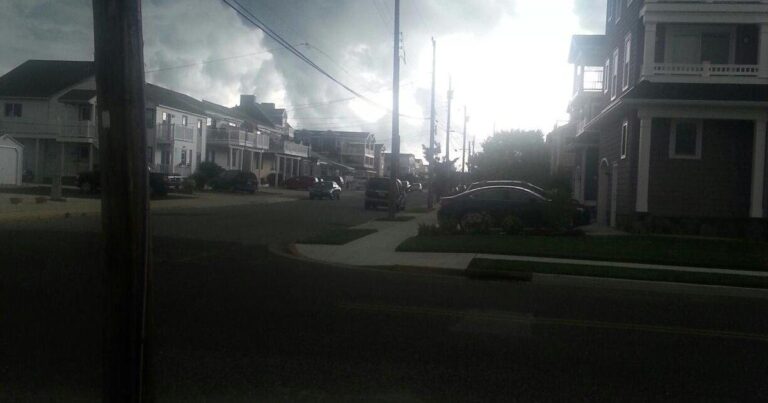Severe Weather Alert: Philadelphia Region Faces Intense Storms After Heatwave
Following an extended period of sweltering heat, the Philadelphia area is now on alert for a dramatic change in weather patterns. Meteorological experts predict a surge of powerful storms sweeping through the region, bringing with them heavy downpours, strong wind gusts, and frequent lightning strikes. The National Weather Service has issued warnings emphasizing the potential dangers these storms pose to both residents and infrastructure. Authorities recommend vigilance and preparedness as the community transitions from extreme heat to volatile weather conditions.
Key anticipated weather impacts include:
- Wind gusts potentially surpassing 50 mph, threatening to topple trees and disrupt power lines
- Periods of intense rainfall that may trigger flash flooding, especially in flood-prone neighborhoods
- Isolated thunderstorms with lightning, necessitating caution for outdoor activities
| Day | High Temperature (°F) | Wind Gusts (mph) | Chance of Precipitation (%) |
|---|---|---|---|
| Today | 88 | 20 | 35 |
| Tomorrow | 74 | 45 | 85 |
| Day After Tomorrow | 70 | 55+ | 75 |
Understanding the Risks: Heavy Rainfall and Strong Winds
As the oppressive heat wave fades, the atmospheric conditions are becoming conducive to severe weather events. Meteorologists warn that the Philadelphia region could experience significant rainfall accumulations, with some areas receiving over two inches of rain within a short period. This raises the risk of flash flooding, particularly in urban zones with poor drainage systems. Additionally, wind speeds are expected to intensify, with gusts reaching up to 60 mph, which can cause damage to weaker structures and lead to widespread power outages.
Highlighted hazards include:
- Heavy Rainfall: Potential for rapid water accumulation on streets, increasing flood risk.
- Strong Winds: Sustained winds between 30-40 mph, with gusts up to 60 mph capable of uprooting trees and damaging property.
- Power Interruptions: Falling branches and debris may disrupt electrical service across neighborhoods.
- Travel Challenges: Flooded roads and fallen trees could cause significant delays and road closures.
| Hazard | Potential Impact | Recommended Precautions |
|---|---|---|
| Heavy Rain | Urban Flooding | Avoid low-lying areas and heed local flood warnings |
| Strong Winds | Falling Trees and Debris | Secure outdoor belongings and remain indoors during peak winds |
| Power Outages | Service Disruptions | Keep emergency lighting and supplies accessible |
How to Prepare for the Approaching Storms
Stay Updated: Regularly check trusted weather sources such as the National Weather Service, local news outlets, and official weather apps. Weather conditions can evolve rapidly, so setting up alerts on your smartphone and having a battery-powered radio ready can be lifesaving during power outages. Understanding the specific threats—whether flooding, lightning, or high winds—will help you respond appropriately.
Secure Your Home and Family: Bring in or firmly anchor outdoor furniture, decorations, and trash bins to prevent them from becoming airborne hazards. Assemble an emergency kit stocked with essentials like bottled water, non-perishable food, flashlights, extra batteries, and first-aid supplies. Ensure all household members are familiar with evacuation routes and establish a clear communication plan. Keep vehicles fueled and avoid unnecessary travel during the storm to minimize risk.
| Preparation Task | Suggested Action |
|---|---|
| Monitor Weather | Check updates at least every 30 minutes |
| Emergency Kit | Include water, food, medications, and flashlights |
| Secure Outdoor Items | Bring inside or firmly tie down |
| Communication Plan | Share emergency contacts and meeting points |
Official Guidance from Local Authorities
Local officials are urging residents to take proactive safety measures as the storm system approaches. Emergency management teams have highlighted the importance of securing loose outdoor items, preparing emergency supplies, and remaining indoors during the height of the storm. Several community centers have been designated as emergency shelters to provide refuge for those without safe housing. Authorities also advise avoiding flooded roads and reporting any downed power lines immediately to emergency services.
Recent updates from the National Weather Service indicate the possibility of heavy rain, strong winds, and even isolated tornado activity over the next 48 hours. Below is a summary of recommended safety actions:
| Safety Measure | Recommended Action |
|---|---|
| Secure Outdoor Items | Anchor patio furniture, trash bins, and decorations securely |
| Emergency Supplies | Stock water, non-perishable food, flashlights, and batteries |
| Stay Informed | Follow official alerts via radio, television, and mobile apps |
| Travel Safety | Refrain from driving during heavy rain or flooding |
Final Thoughts on the Weather Transition
As the Philadelphia region moves past the recent heatwave, residents should remain alert to the incoming threat of severe storms. Meteorologists continue to monitor evolving conditions closely and stress the importance of preparedness and caution. Staying informed through reliable sources and following safety recommendations will help protect lives and property during this period of unstable weather. CBS News remains committed to providing timely updates to keep the community safe and well-informed.


